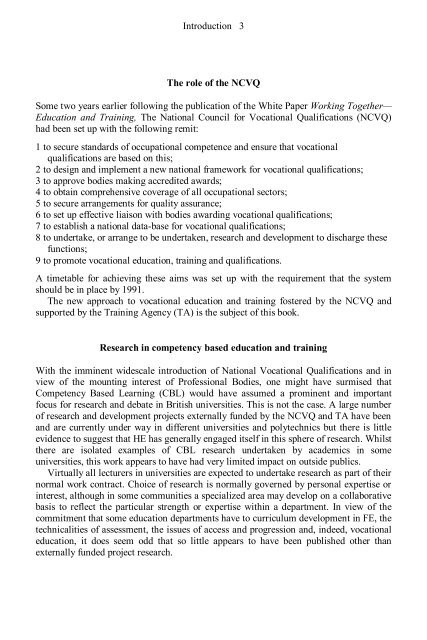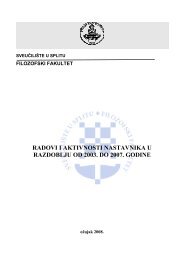Competency Based Education and Training
Competency Based Education and Training
Competency Based Education and Training
You also want an ePaper? Increase the reach of your titles
YUMPU automatically turns print PDFs into web optimized ePapers that Google loves.
Introduction 3<br />
The role of the NCVQ<br />
Some two years earlier following the publication of the White Paper Working Together—<br />
<strong>Education</strong> <strong>and</strong> <strong>Training</strong>, The National Council for Vocational Qualifications (NCVQ)<br />
had been set up with the following remit:<br />
1 to secure st<strong>and</strong>ards of occupational competence <strong>and</strong> ensure that vocational<br />
qualifications are based on this;<br />
2 to design <strong>and</strong> implement a new national framework for vocational qualifications;<br />
3 to approve bodies making accredited awards;<br />
4 to obtain comprehensive coverage of all occupational sectors;<br />
5 to secure arrangements for quality assurance;<br />
6 to set up effective liaison with bodies awarding vocational qualifications;<br />
7 to establish a national data-base for vocational qualifications;<br />
8 to undertake, or arrange to be undertaken, research <strong>and</strong> development to discharge these<br />
functions;<br />
9 to promote vocational education, training <strong>and</strong> qualifications.<br />
A timetable for achieving these aims was set up with the requirement that the system<br />
should be in place by 1991.<br />
The new approach to vocational education <strong>and</strong> training fostered by the NCVQ <strong>and</strong><br />
supported by the <strong>Training</strong> Agency (TA) is the subject of this book.<br />
Research in competency based education <strong>and</strong> training<br />
With the imminent widescale introduction of National Vocational Qualifications <strong>and</strong> in<br />
view of the mounting interest of Professional Bodies, one might have surmised that<br />
<strong>Competency</strong> <strong>Based</strong> Learning (CBL) would have assumed a prominent <strong>and</strong> important<br />
focus for research <strong>and</strong> debate in British universities. This is not the case. A large number<br />
of research <strong>and</strong> development projects externally funded by the NCVQ <strong>and</strong> TA have been<br />
<strong>and</strong> are currently under way in different universities <strong>and</strong> polytechnics but there is little<br />
evidence to suggest that HE has generally engaged itself in this sphere of research. Whilst<br />
there are isolated examples of CBL research undertaken by academics in some<br />
universities, this work appears to have had very limited impact on outside publics.<br />
Virtually all lecturers in universities are expected to undertake research as part of their<br />
normal work contract. Choice of research is normally governed by personal expertise or<br />
interest, although in some communities a specialized area may develop on a collaborative<br />
basis to reflect the particular strength or expertise within a department. In view of the<br />
commitment that some education departments have to curriculum development in FE, the<br />
technicalities of assessment, the issues of access <strong>and</strong> progression <strong>and</strong>, indeed, vocational<br />
education, it does seem odd that so little appears to have been published other than<br />
externally funded project research.

















